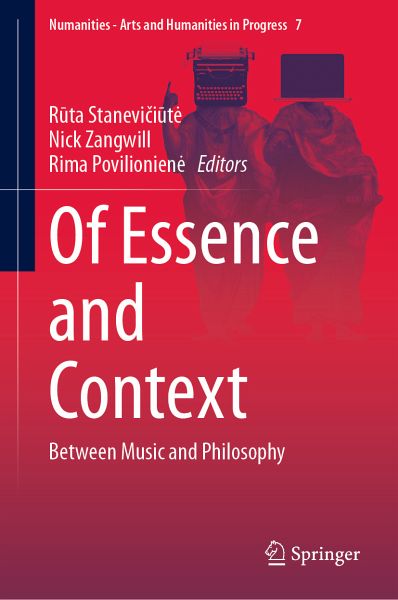
Of Essence and Context (eBook, PDF)
Between Music and Philosophy
Redaktion: Staneviciute, Ruta; Povilioniene, Rima; Zangwill, Nick
Versandkostenfrei!
Sofort per Download lieferbar
48,95 €
inkl. MwSt.
Weitere Ausgaben:

PAYBACK Punkte
24 °P sammeln!
This book provides a new approach to the intersections between music and philosophy. It features articles that rethink the concepts of musical work and performance from ontological and epistemological perspectives and discuss issues of performing practices that involve the performer's and listener's perceptions.In philosophy, the notion of essence has enjoyed a renaissance. However, in the humanities in general, it is still viewed with suspicion. This collection examines the ideas of essence and context as they apply to music. A common concern when thinking of music in terms of essence is the ...
This book provides a new approach to the intersections between music and philosophy. It features articles that rethink the concepts of musical work and performance from ontological and epistemological perspectives and discuss issues of performing practices that involve the performer's and listener's perceptions.
In philosophy, the notion of essence has enjoyed a renaissance. However, in the humanities in general, it is still viewed with suspicion. This collection examines the ideas of essence and context as they apply to music. A common concern when thinking of music in terms of essence is the plurality of music. There is also the worry that thinking in terms of essence might be an overly conservative way of imposing fixity on something that evolves. Some contend that we must take into account the varying historical and cultural contexts of music, and that the idea of an essence of music is therefore a fantasy.
This book puts forward an innovative approach that effectively addresses these concerns. It shows that it is, in fact, possible to find commonalities among the many kinds of music. The coverage combines philosophical and musicological approaches with bioethics, biology, linguistics, communication theory, phenomenology, and cognitive science. The respective chapters, written by leading musicologists and philosophers, reconsider the fundamental essentialist and contextualist approaches to music creation and experience in light of twenty-first century paradigm shifts in music philosophy.
In philosophy, the notion of essence has enjoyed a renaissance. However, in the humanities in general, it is still viewed with suspicion. This collection examines the ideas of essence and context as they apply to music. A common concern when thinking of music in terms of essence is the plurality of music. There is also the worry that thinking in terms of essence might be an overly conservative way of imposing fixity on something that evolves. Some contend that we must take into account the varying historical and cultural contexts of music, and that the idea of an essence of music is therefore a fantasy.
This book puts forward an innovative approach that effectively addresses these concerns. It shows that it is, in fact, possible to find commonalities among the many kinds of music. The coverage combines philosophical and musicological approaches with bioethics, biology, linguistics, communication theory, phenomenology, and cognitive science. The respective chapters, written by leading musicologists and philosophers, reconsider the fundamental essentialist and contextualist approaches to music creation and experience in light of twenty-first century paradigm shifts in music philosophy.
Dieser Download kann aus rechtlichen Gründen nur mit Rechnungsadresse in A, B, BG, CY, CZ, D, DK, EW, E, FIN, F, GR, HR, H, IRL, I, LT, L, LR, M, NL, PL, P, R, S, SLO, SK ausgeliefert werden.












